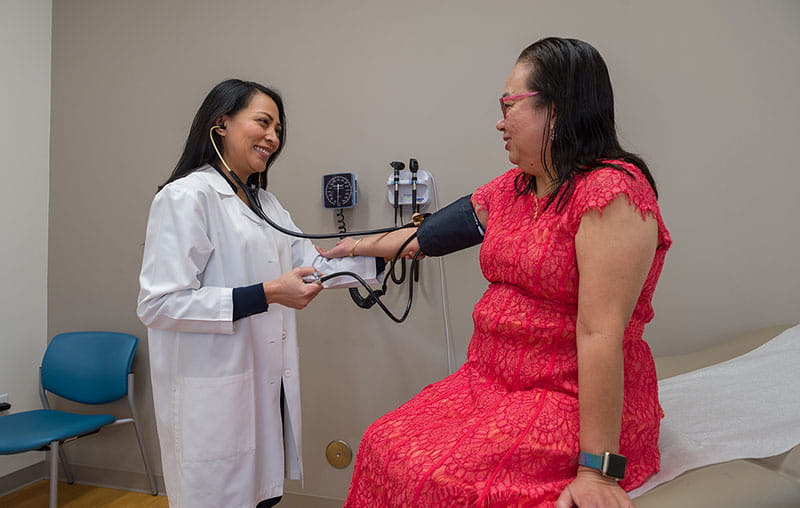Andre McAllister had been diagnosed with heart failure more than a decade ago, and it was not a new experience for him to go to University Hospital if his body started to swell from retaining too much water. In mid-April 2022, however, he learned something was different.
Not a Routine Visit
“I was retaining water for years, so I’d go to University Hospital to get the water out and then go home. It was something I was used to doing,” Andre said. “But this time it was really bad. I could barely breathe. I started getting dizzy and seeing spots, and I wasn’t using the restroom.”
After being treated for almost two weeks, Andre was ready to go home. But in the days leading up to his anticipated discharge date, Andre’s blood work showed his kidney function was slowly worsening, though he did not feel much different. The University Hospital team was concerned his kidney function would get to the point where he would need dialysis. His blood pressure was also starting to slowly decrease.
Andre needed to start on more powerful medication through his IV to improve his blood pressure in hopes that his kidneys would get enough blood flow to improve. Although these medications can improve blood flow, they can cause dangerous rhythms and damage the heart muscle.
Cardiac ICU
Although he was upset upon hearing the news that he wouldn’t be able to leave yet, Andre accepted these treatments. But he was worried about how the medications could affect his heart. As he was getting sicker, the cardiology ICU team consulted with Dr. Imran Aslam, an advanced transplant cardiologist and interventional cardiologist at University Hospital. Dr. Aslam explained the situation to Andre.
“Dr. Aslam told me, ‘I’ll give it to you straight. If any one of these four medications stop, you’ll probably die within a couple of hours because your blood pressure would drop so low,’” Andre said. He was baffled by this news. “I wondered, how was I just about to go home, and now I’m about to die?”
Cardiogenic Shock
Dr. Aslam explained that Andre was in cardiogenic shock — his ejection fraction was approximately 10-15%, and his creatinine level was approximately 3.5, which was almost triple what it had been the previous week. Although much of the water had been drained from Andre’s body — “my skin was so dry it felt like lizard skin” — his heart was so weak that the blood wasn’t flowing normally to the kidneys. As a result, there was still water in his body that was congesting his organs, including his kidneys.
Dr. Aslam said that in addition to those four IV medications, Andre also needed an intra-aortic balloon pump (IABP) inserted through his groin and a Swan-Ganz catheterization (right heart catheterization) in his neck to monitor the fluid status and heart function on an hour-to-hour basis.
Thanks to Dr. Aslam’s expertise and speedy interventions — including returning his heart to a normal rhythm and having the cardiac electrophysiologists insert a pacemaker — Andre’s heart function improved, and his organs soon started functioning again. His creatinine level returned to normal range, and his ejection fraction improved significantly.
"I'm finally getting a cure."
“All these years, it had been a struggle to sweep or mop or take a shower,” Andre said. “I would take two or three steps and I was breathing heavy. But now I run up my stairs for exercise. I haven’t been able to do that in 10 or 15 years. I have some of my independence back. This is the best I’ve felt in years.
“I’ve been going to the hospital for treatments all this time, and now I’m finally getting a cure,” Andre said. “That’s the difference with Dr. Aslam.”
A Teaching Moment
University Hospital is an academic center and teaching hospital, and Andre appreciated watching Dr. Aslam educating residents about the hidden signs of cardiogenic shock and how best to manage a patient with a weak heart muscle who was as sick as he was.
“Because they’re doing their residency, they’re training and thinking more about what the possibilities could be,” Andre said. “Dr. Aslam would tell them to not just think about what they learned in their textbooks. He would say, ‘Let me tell you what’s really going on.’ He was always teaching the residents about why he was doing what he was doing — because of his experience, he knew I was sicker than the residents could see.”
Heart Care at University Health
The University Health Heart and Vascular Institute is a nationally recognized center. The multiple awards our team has earned reflect our commitment to providing the highest quality care to each of our patients.




